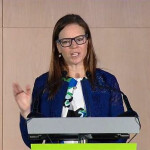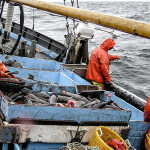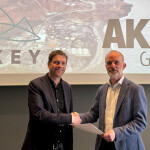Although there has been no shortage of fly-on-the-wall documentary makers to have shadowed the fishing industry through recent years, a gritty new TV series is aiming to give the U.K. public a much stronger affinity for the commercial fishing industry by following a handful of boats and showing exactly how hard the crews have to work and how much courage is required to forge a living out of the sea.
Every day off the U.K. coast, scores of deep-sea fishing crews battle rough seas, taking plenty of risks, in order to seek out the most valuable fish. But even when they find what they are looking for, it’s by no means a guarantee of rich rewards – a challenge which, alongside spending considerable time away from families, has contributed to a shortage of young men who have grown up in traditional fishing communities following in their fathers’ footsteps.
Recruiters at some of the country’s busiest ports therefore have to find new fishermen from much farther afield. Although willing, many have no background in the industry. To emphasize this trend, much of the first episode of Channel 4’s “The Catch,” that began airing last week, entitled “In at the deep end,” was seen through the wide eyes of a 21-year-old rookie deckhand on his maiden fishing trip.
While lighter moments brought through the camaraderie of the tightly-knit crew as they co-exist in claustrophobic environments, the series is underpinned by the understanding that deep-sea fishing is one of the most dangerous professions in the world. As such, a very respectable 1.5 million viewers quickly discovered that life aboard a fishing boat is about much more than catching fish. Not only did they see how hard the work is on limited sleep in almost unworkable conditions, they were also given a somber insight into the stress brought by low prices in fish markets and the further risks the fishermen will take to overcome such scenarios.
In the first episode, Phil, the skipper of a large gillnetter called the “Govenek of Ladram,” learned that southern U.K. markets had been flooded with fish from overseas boats ahead of an incoming storm, which in turn had driven prices down to “rock bottom” levels. Reluctant to head back to the safety of Newlyn harbor with a loss-making catch, he elected to brave the elements – gale-force 10 winds, 40-foot swells, and relentless rain – and steam for 15 hours and 197 miles to the Continental Shelf in the Atlantic Ocean, with the outlook that “sometimes it’s not popular with the crew but some of our biggest catches have come in horrendous weather.”
The crew, comprising share fishermen who will only get paid if the trip is profitable, were fully compliant with the plan, despite many of the senior members having had bad experiences at sea, including witnessing fatalities. But they have often found that covering the significant fuel costs of a week-long trip at sea can boil down to one good last day’s fishing. “Hit a big school of turbot and suddenly everything’s OK,” said one crewmember.
Even then, how much money the catch earns depends on how many other boats braved the bad weather, and also finding the best market to sell at.
This time, the Govenek’s gamble of GBP 7,000 (EUR 9,528; USD 10,695) worth of fuel steaming to the distant grounds paid off, and after nine days at sea the ice room was close to full with turbot, hake and monkfish – some 500 boxes of fish.
The trip earned GBP 50,000 (EUR 68,050; USD 76,389), with turbot getting a top price of GBP 10 (EUR 13.61; USD 15.28) per kg thanks to so few boats going out to sea.
There are an estimated 12,000 commercial fishers in the United Kingdom, who landed an estimated GBP 718 million (EUR 977.2 million; USD 1.1 billion) worth of fish and shellfish last year. However, due to their significant overheads, the fleet’s total operating profit was less than GBP 150 million (EUR 204.1 million; USD 229.2 million).
But as the narrator remarked in the opening seconds of episode one, “fishermen are very much a breed apart.”






